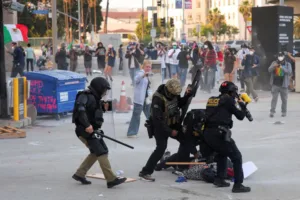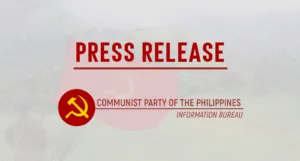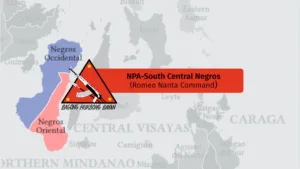1. What is your comment on the claim of Duterte, his military minions and some renegades that the armed revolution in the Philippines is going in circles and is futile and that it is certain to be destroyed by the Duterte regime?
JMS: The Communist Party of the Philippines started with only a few scores of members in 1968. Now it has tens of thousands of members nationwide. The New People’s Army started with only 9 automatic rifles and 26 inferiors firearms. Now, it has thousands of Red fighters nationwide, with auxiliary forces of tens of thousands in the people’s militia and hundreds of thousands in the self-defense teams of mass organizations.
The mass base included only 20,000 workers and 15,000 youth in 1968 and only 80,000 peasants in 1969. Now, the mass base is in the millions nationwide, with members in several types of revolutionary organizations which elect the local organs of political power. These constitute the people’s democratic government of workers and peasants in the countryside in opposition to the reactionary government of big compradors and landlords in the cities.
The people’s democratic revolution through protracted people’s war has grown in strength and advanced against the semicolonial and semifeudal ruling system. This system is stricken by a chronic economic and political crisis and headed by a series of corrupt and brutal ruling cliques serving foreign monopoly capitalism and the local exploiting classes. The crisis of the ruling system is now rapidly worsening, aggravated by Duterte’s unleashing state terrorism and plundering the national treasury and the entire economy.
2. But what about the claim of Duterte in his final state of the nation address that his military forces are winning?
In his final state of the address, he claims that his military minions have caused the surrender of 17,000 Red fighters and dismantled 15 guerrilla fronts. That is a blatant lie. The figure of 17,000 surrenderers is so many times the understated estimate of NPA strength by his own military. But indeed, military officers have staged fake surrenders and ordered the murder of civilians in order to collect reward money. And the figure of 15 guerrilla fronts dismantled is pure illusion because in the fluid people’s war the reactionary military often mistakes the retreat or shifting by the NPA as permanent withdrawal or disintegration.
Military overspending and militarization of civilian departments and agencies by the Duterte regime has contributed greatly to the crisis of the ruling system and has generated corruption in the military under various triad campaigns of psywar, intelligence and combat and with unaudited funds for the so-called localized peace talks, Enhanced-Comprehensive Local Integration Program, Community Support Program and Barangay Development Program.
Taking advantage of the Covid-19 pandemic, Duterte has railroaded the law of state terrorism, far worse than the martial law of 1972. This fascist law makes the social activists and critics of the regime subject to red-tagging, abduction, torture and murder under the direction of the so-called Anti-Terrorism Council. In his drive to make himself a fascist dictator, he is pushing a trend of militarism that discredits, isolates and actually undermines the entire ruling system.
3. Why have the Communist Party of the Philippines and the armed revolutionary movement become strong in the last more than 52 years?
JMS: The Party and the armed revolution have become strong by serving the Filipino people in their struggle for national and social liberation against the evil forces of foreign monopoly capitalism, big comprador capitalism, domestic feudalism and bureaucrat capitalism. The people have been compelled to engage in armed revolution because of the escalating conditions of oppression and exploitation. The more brutal and corrupt the reactionary regimes, like those of Marcos and Duterte, the faster the growth and advance of the people’s war.
4. It is fine that there are already local organs of political power constituting the people’s democratic government based in the country. But when shall the people’s war result in the seizure of the cities from the hands of the exploiting classes?
JMS: The people’s army can ultimately gain more strength for seizing the cities from the exploiting classes by using the countryside to preserve itself, repeatedly win tactical offensives and accumulate strength. While the people’s war is going on mainly in the countryside, it has an impact and inspiring effect on the urban-based legal struggles of various political formations. It is a rising factor in the broadly-based and multipronged struggle of the people against their enemy.
5. Do you think that further advances can be made in the people’s war in a self-reliant way? What does it take for the New People’s Army to graduate from the strategic defensive to the strategic stage of the people’s war?
JMS: The CPP and the NPA have excellently demonstrated that they can wage the people’s war self-reliantly and advance through more than 52 years with practically no military assistance from abroad. According to knowledgeable sources, more than 95 percent of NPA arms have been accumulated through its tactical offensives against the enemy. The local donations and purchases of arms are in the range of only 5 percent or less. The records of the reactionary armed forces for a certain period show that 13,300 of their troops have been wiped out and have lost their weapons to the NPA aside from armed seizures in raids on AFP armories, police stations and paramilitary units.
The Philippines is an archipelagic country and the Filipino revolutionaries cannot avail of cross-border cooperation with revolutionary forces in neighboring countries like the Chinese revolutionaries had with the Soviet Union and like the Indochinese revolutionaries had with China in past historical periods. The Filipino revolutionaries are required to lure the reactionary armed forces to the countryside, wipe them out here and seize the arms from them.
The people’s war in the Philippines is now in general advancing from the middle phase to the advanced phase and completion of the strategic defensive. At this time, platoons and companies are the kind of fighting formations being developed and multiplied in more than 110 guerilla bases for extensive and intensive guerrilla warfare nationwide. The NPA has the strength, experience and skills to complete the strategic defensive in accordance within the principle of self-reliance.
6. How is the strategic stalemate going to be developed?
JMS: Even during the current period of the strategic defensive, many municipalities with a police force no bigger than a platoon and ostensibly under the rule of the reactionaries are already stalemated by the platoons radiating from the guerrilla fronts. But of course, in the stage of the strategic stalemate, the NPA shall be developing more companies and battalions for combat and will be covering extensive contiguous areas like districts and provinces.
Conceivably, it will be easier eventually for the NPA to change the balance of forces in provinces and regions through tactical offensives in regular mobile warfare. The stage of the strategic stalemate will be far shorter than that of the strategic defense. You can easily calculate how much higher is the capacity of companies and battalions of the NPA to defeat the enemy than that of platoons and companies.
7. How can the NPA develop fully the strategic stalemate and proceed to the strategic offensive? How will the strategic offensive be undertaken?
JMS: The NPA can develop fully the strategic stalemate self-reliantly. With companies and battalions to use in regular mobile warfare, the NPA is already capable of seizing at will major towns and provincial capitals in order to keep them for a while or to briefly attract enemy forces for annihilation. Without US aggression to head it off and delay it, the strategic offensive will be possible against the major enemy camps and major cities by battalions and regiments in a combination of regular mobile warfare, positional warfare and people’s uprisings.
US imperialism considers the Philippines a major ally in East Asia. There is high probability that US imperialism will wage a war of aggression to try to save the local ruling system. But the NPA shall already have acquired the political strength, weapons and skills to counter US airpower and give powerful blows to the US aggressors as in the Vietnam war. And the US may not be able to carry out its aggression effectively because it continues to be overstretched and to decline strategically. Look at how it has wasted resources in endless wars in Central and West Asia and failed to fully subjugate Iraq, Syria and Afghanistan.
8. How fast do you think will the inter-imperialist contradictions, people’s resistance and resurgence of the socialist cause develop and extend support to the Philippine revolution?
JMS: The revisionist betrayal of socialism, the neoliberal policy of unbridled greed, the rise of state terrorism, fascism and the wars of aggression have inflicted so much intolerable suffering on the broad masses of the people in the imperialist countries and in the underdeveloped countries. The imperialist states are faced with the intensifying class struggle due to the crisis of overproduction. They are also involved in escalating inter-imperialist contradictions, with the contradiction of the US and China becoming most conspicuous since the financial meltdown of 2008.
The proletariat and people of the world, especially in the underdeveloped countries, are intensifying their resistance to the ruthless attempts of the imperialist powers to shift to them the burden of the crisis of the world capitalist system. The anti-imperialist and democratic mass struggles are rising and spreading on a global scale. These are the prelude to the resurgence of the world proletarian-socialist revolution. Those who advocate national liberation, democracy and socialism are inspired to fight for their revolutionary cause.
9. Is there no possibility of the armed revolution being interrupted by the CPP and NDFP agreeing to a coalition government of national unity, peace and development?
JMS: The legal patriotic and progressive forces and the forces of the armed revolutionary movement have grown so much that they can aim to address the roots of the armed conflict through peace negotiations and agreements on basic social, economic and political reforms that can lead to a coalition government of national unity, peace and development.
But the ultra-reactionary currents of neoliberalism and fascism are also running high. Right here in the Philippines, there is the recrudescence of fascist dictatorship from Marcos to Duterte. So, the revolutionary forces, as well as the legal democratic forces, have to be vigilant and be ready to fight the current traitorous, brutal and corrupt Duterte regime and the obvious scheme of US imperialism to tighten its control over the Philippines in competition with Chinese imperialism.
10. Is there any possibility that pro-US and pro-China political and economic interests will develop violent contradictions? How will China react?
JMS: Violent contradictions among the reactionaries are possible. At the least, these two competing reactionary interests are now boasting of money flowing from their respective funding US and Chinese sources. They are not far off from arming themselves and seeking arms from their conflicting sources. But China will officially deal mainly with whichever is the ruling clique in the reactionary state. That has been the policy and behavior of China since its restoration of capitalism. It has diplomatic and trade relations with all kinds of states.
11. Will China support the armed revolutionary movement led by the Communist Party of the Philippines? Will China have relations with the CPP after it succeeds in establishing the people’s democratic state in the Philippines after it is is established by the Philippine revolution?
JMS: China is not likely to have any relations with the armed revolutionary movement led by the Communist Party of the Philippines. But China has maintained a foreign policy of having relations with any kind of state. It has such relations with the most reactionary states as well as with states that are anti-imperialist and adhere to socialism. It is very likely that it shall have diplomatic and trade relations with a people’s democratic state after this is established by the armed revolution in the Philippines.
China has avoided the expression proletarian internationalism and has disengaged from armed revolutionary struggles led by communists from the time that Deng Xiaoping carried out a counterrevolutionary coup in October 1976, condemned the Great Proletarian Cultural Revolution, put aside the proletarian class struggle, adopted capitalist reforms, opened up China for integration in the world capitalist system and developed close relations with the US. China and the US have been close partners in promoting neoliberalism until their contradictions surfaced in the second decade of this century.
12. What about the unlawful claims of China over the West Philippine Sea? Will they not obstruct or damage relations with the future people’s democratic state?
JMS: I presume that by the time that the people’s democratic state shall have been established in the Philippines, China shall have realized the futility of insisting on sovereign ownership of more than 90 percent of the South China Sea and encroaching on the West Philippine Sea in violation of the UN Convention on the Law of the Sea and the 2016 judgment of the Permanent Arbitration Court in favor of the Philippines against China. It will be costly to China to offend the coastal states of Southeast Asia.
At any rate, the people’s democratic state in the Philippines will be open to diplomatic and trade relations with China in the same way that Vietnam and China have such relations despite their dispute over sovereign and maritime rights in the Paracels. The diplomatic relations can open the way to a peaceful resolution of issues. In any case, the people’s democratic state will always assert the sovereign and maritime rights of the Philippines over its exclusive economic zone and extended continental shelf in the West Philippine Sea.###











